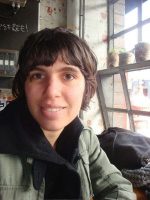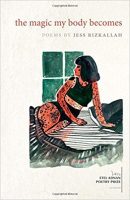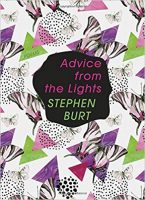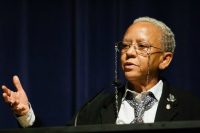October 26, 2017
Edited by David Sanders
Specimen Days
1607—Philipp Nicolai, German Lutherian theologist/poet/composer, dies at 52.
1658—Francisco de Borja y Aragon Esquilache, Spanish poet, dies.
1661—Johann B Schup, [Schuppius], German poet/historian/vicar, dies.
1791—Charles Sprague, banker/poet (Curiosity), born in Boston, Massachusetts, is born.
1911—Sorley MacLean Somhairle MacChaluim, poet, is born.
1945—Demetris Th. Gotsis, Greek poet and author, is born.
1947—Trevor Joyce, Irish poet, is born.
1952—Andrew Motion, English poet (British Poet Laureate 1999-2009), is born.
1994—Rudi van Vlaenderen, Flemish actor/dir/poet (Thyestes), dies at 64.

Would everything we said
be written on your face, like the white cross on the heavens?
Of course not. It was written in us, where no one could find it
except ourselves. Your own face was wiped entirely clean—
and so, with your particular worries solved, and your sadness,
I could see more clearly than ever how like mine it was,
and therefore how my head will eventually look on the pillow
when the wall opens behind me, and I depart with my failings.
—from “Passing On” by Andrew Motion
“Would everything we said / be written on your face, like the white cross on the heavens? / Of course not.” – Andrew Motion
World Poetry
Indigenous Poet Ellen van Neerven Subject to Online Abuse by Students after HSC

Authors and poets have lept to the defence of an award-winning Indigenous writer after she was allegedly abused online by year 12 students. Ellen van Neerven also received messages asking her to explain her poem Mango from the book Comfort Food after students sitting the HSC English exam on Monday were asked to analyse the work.
Researchers Raise Doubts over Cause of Chilean Poet Neruda's Death
International researchers investigating the death of Chilean poet Pablo Neruda raised doubts on Friday as to whether he died of cancer 44 years ago as previously presumed, and did not rule out foul play. Neruda, known for his passionate love poems and staunch communist views, died days after a coup in September 1973 that ushered in the brutal dictatorship of Augusto Pinochet.
Imprisoned Palestinian Poet Ashraf Fayadh Wins PEN Canada One Humanity Award
PEN Canada announced yesterday that they had named Palestinian poet Ashraf Fayadh, currently serving an eight-year and 800-lash prison sentence in Abha, Saudi Arabia — winner of the 2018 PEN Canada One Humanity Award. The award is set to be presented, in absentia, on October 20 at Toronto’s International Festival of Authors.
Australian students have been posting racist memes about INdigenous poet Ellen Van Neerven.
Recent Reviews
“A Beautiful Space That Slips Away”: Philippe Soupault and the French Avant-Garde
by Paul Maziar
Late last year, City Lights Books published Lost Profiles: Memoirs of Cubism, Dada, and Surrealism, a collection of work by French poet Philippe Soupault, rendered into English mostly for the first time by Alan Bernheimer. The book traces the history of those seminal early 20th-century aesthetic movements, offering penetrating portraits of many of Soupault’s close writer and artist friends, such as André Breton, with whom he co-founded Surrealism. A more amiable figure than many of his cohort, Soupault was, according to Breton, “joy personified, the poetry of the fleeting moment, prodigiously tactful, a beautiful space that slips away.”
A Deeply Human Act: Don’t Call Us Dead by Danez Smith
by Chelsea Dingman
For the boys of Danez Smith’s National Book Award-finalist collection, Don’t Call Us Dead,
_____every year, days get longer.
time clogged with boys. the boys
O the boys. they still come
in droves. the old world
keeps choking them. our new one
keeps spitting them out.
Accepting early death as a foregone conclusion is the obsession of the stunning, long narrative sequence, “summer, somewhere,” that imagines an afterlife for the victims of violence and opens the book.
Late last year, City Lights Books published Lost Profiles: Memoirs of Cubism, Dada, and Surrealism, a collection by French poet Philippe Soupault.
Broadsides
A Poem for Richard Wilbur: Remembering the Former U.S. Poet Laureate
by Brooke Hauser
Richard Purdy Wilbur was a United States poet laureate, a two-time Pulitzer Prize winner, a celebrated literary translator and a beloved college professor. But to many people in Cummington (pop. 907 at last count), where he lived for nearly 50 years, he was more commonly known as Dick, a congenial man who delighted in life’s simple pleasures. He was a regular at The Old Creamery Co-op, where he would meet up with the other former national poet laureate with a Cummington connection, William Jay Smith, better known as Bill. The two poets “would come in and fight with each other about who would get here earlier on a Sunday, and leave little poetry notes on each other’s newspapers — it was 20 years ago,” recalled Noel Shears-Pennell, now a cook at the Creamery who, back then, worked as a cashier and in the deli.
Why the TS Eliot Prize Shortlist Hails a Return to the Status Quo
This year’s lineup may be deserving, but with just one collection by a BAME poet in an exceptionally strong year for poets of colour, it also seems naive
by Sandeep Parmar
Over the past few years, challenges to British poetry’s lack of diversity have made it impossible to return to the status quo – or so we thought. This year’s TS Eliot prize shortlist, announced on Thursday, features just one collection (out of 10, including Michael Symmons Roberts and Leontia Flynn) by a poet of colour, the much-acclaimed Night Sky with Exit Wounds by Ocean Vuong. For those who have championed crucial interventions in poetry publishing, reviewing and prizes, this nearly all-white shortlist cannot help but seem inexplicably naive and regressive.
This year’s TS Eliot prize shortlist, announced on Thursday, features just one collection by a poet of colour.
Drafts & Fragments
Skull Drinking Cup with Romantic Associations

The top part of a human skull, with an association to Lord Byron, is one of the more unusual lots going under the Charterhouse hammer in their two day 19th & 20th October auction. “As one of the greatest British poets, a peers, a politician and a leading figure in the Romantic Movement Lord Byron needs little introduction.” Commented Richard Bromell. “Anything with an association or connection to Lord Byron is of great interest to collectors, even if it is part of a human skull.”
His Second Boring Machine
Elon Musk is invoking the spirit of a dead poet to help him bore.
by Thu-Huong Ha
Musk has been developing machines to dig a network of tunnels he’s promised, in order to connect cities like New York and Washington, D.C. with a hyperloop train. On Oct. 18, the entrepreneur tweeted that another of his Boring Company machines is almost ready, and that it’s called “Line-Storm,” named after an early 20th-century poem by Robert Frost.
The top part of a human skull, with an association to Lord Byron, is one of the more unusual lots going under the Charterhouse hammer.
Poetry In the News
Even Lawrence Ferlinghetti Can't Save 'Poets Plaza' Plan In North Beach
A long discussed, previously quashed plan to close down a block of Vallejo Street in North Beach in front of the Church of St. Francis from Assisi to create Piazza Saint Francis, The Poets Plaza, has once again been dismissed by the SFMTA Board*, which has approval power over all such road closures. The plan, first conceived by SF's senior poet laureate and longtime North Beach denizen Lawrence Ferlinghetti, has been pushed for years by onetime supervisor Angela Alioto, and she came with a cadre of a couple dozen supporters to the Tuesday meeting. But they were met with almost twice as many in opposition to the plan, as the Examiner reports.
Instapoet Rupi Kaur May Be Controversial, but Fans and Book Sales Are on Her Side

“Milk and Honey,” the debut collection by 25-year-old Canadian poet Rupi Kaur, is the top-selling book in the United States this year so far, but its competition may have finally arrived — in the form of Kaur’s second book of poetry, “The Sun and Her Flowers” (Andrews McMeel, $16.99.) Kaur is a leader in the new movement of writers known as Instapoets, due not, as some might imagine, to instantaneous careers or fame, but because they have grown substantial readerships by sharing their poetry on Instagram. As of this writing, Kaur has 1.7 million Instagram followers, including pop star Ariana Grande (two days ago it was 1.6 million).
“Milk and Honey,” the debut collection by Rupi Kaur, is a top-selling book, but its competition may have finally arrived — Kaur’s second book.
New Books
the magic my body becomes: Poems by Jess Rizkallah
[Paperback] University of Arkansas Press, 70 pp., $16.95

In the magic my body becomes, Jess Rizkallah seeks a vernacular for the inescapable middle ground of being Arab American—a space that she finds, at times, to be too Arab for America and too American for her Lebanese elders. The voice here freely asserts gender, sexuality, and religious beliefs, while at the same time it respects a generational divide: the younger’s privilege gained by the sacrifice of the older, the impossibility of separating what is wholly hers from what is hers second-hand.
Talking Pillow by Angela Ball
[Paperback] University of Pittsburgh Press, 72 pp., $15.95
Talking Pillow celebrates love as amazement, sustenance, and the progenitor of scarce-believable loss. The book centers around the sudden death of the author’s long-time partner and travels outward to events in the world at large. Imagining themselves into multiple times, places, and lives, the poems comically explore the possibilities of attachment between people and the absurdity of death’s sudden intrusion. Antic and often funny, these poems converse with all that we care about, fear, and fail to understand.
The Word We Used For It by Max Garland
[Paperback] University of Wisconsin Press, 88 pp., $14.95

In these poems Max Garland confesses, even revels in, the fabricated nature of memory. He links personal and localized patterns (fingerprints, plowed fields) to the motions animating the insides of atoms and the unfurling of remote galaxies. Back on earth, the poems honor the decidedly homespun quality of grit—how creatures both animal and human bear up in the face of mounting odds against them. Garland suggests that imagination itself requires grit, to be called upon when the more spectacular angels are otherwise occupied.
Disappeared by Jasmine V. Bailey
[Paperback] Carnegie Mellon, 72 pp., $15.95
These poems touch down in many parts of the world, from Argentina during the Dirty War to the alleys of the small towns in South Jersey where the author grew up. An extended study of the love poem, this book explores disappearance through political erasure, the march of time, and personal loss.
Advice from the Lights: Poems by Stephen Burt
[Paperback] Graywolf Press, 96 pp., $16.00

Advice from the Lights is a brilliant and candid exploration of gender and identity and a series of looks at a formative past. It’s part nostalgia, part confusion, and part an ongoing wondering: How do any of us achieve adulthood? And why would we want to, if we had the choice? This collection is woven from and interrupted by extraordinary sequences, including Stephanie poems about Stephen’s female self; poems on particular years of the poet’s early life, each with its own memories, desires, insecurities, and pop songs; and versions of poems by the Greek poet Callimachus, whose present-day incarnation worries (who doesn’t?) about mortality, the favor of the gods, and the career of Taylor Swift. The collection also includes poems on politics, location, and parenthood. Taken all together, this is Stephen Burt’s most personal and most accomplished collection, an essential work that asks who we are, how we become ourselves, and why we make art.
In the magic my body becomes, Jess Rizkallah seeks a vernacular for the inescapable middle ground of being Arab American.
Correspondences
Purdue Professor Writes through Alcohol Addiction in Poetry Collection
by Susie Schmank

Since Kaveh Akbar got sober four years ago, he’s received his PhD in creative writing, published a chapbook called “Portrait of the Alcoholic,” started teaching poetry at Purdue University and released his first full collection of poetry, “Calling a Wolf a Wolf.” In “Calling a Wolf a Wolf,” the Iranian-American poet gracefully walks readers along a path of addiction and through roles that heritage, spirituality and taxonomy played in his recovery.
How Do Poets Choose a Title For Their Books?
by Sarah Blake
A title is a tricky thing — trickier still for a collection of already titled things. For a collection of poems, can an individual poem’s title speak to the entire book? What about one piece of one poem — can that speak to the whole? Should a title say what hasn’t yet been said by the poems? Should it focus one’s attention? Should it capture a tone or mood? Should it be long or short? What makes a title memorable? Why does a title fit, and how do you know?
Loose and Double: A Conversation with Gabrielle Calvocoressi
by Jonathan Farmer

Gabrielle Calvocoressi's latest book of poems, Rocket Fantastic,is both her strangest and her most immediate — at once overtly narrative and startlingly discontinuous, thoroughly kind and streaked with violence, proper to a specific moment and alluringly out of time. It is also a book that I took far more personally than most. Even though most of the poems feature characters (Calvocoressi refers to them as “vessels”) who are overtly fictional, the book also seems to me, as someone who has had the privilege of knowing her for several years, to be a remarkably direct engagement of the person I know with me, as the person (a person, I have to remind myself) reading them.
Poet Nikki Giovanni Says Trump Is “clearly evil” and She Doesn’t Regret Calling Out Bill Cosby
by Natasha S. Alford

Poet Nikki Giovanni has been telling it like it is for over three decades. The award-winning writer, activist and educator became famous during the Black Power and Black Arts movement, delivering poems with themes of unapologetic blackness and feminist thought, all while donning her signature afro. Now the 74-year-old revolutionary wordsmith is back with a new book of poetry called “A Good Cry: What We Learn from Tears and Laughter.” In an exclusive interview with theGrio, Giovanni opens up about how writing the book helped her heal after the loss of dear friend and fellow poet Dr. Maya Angelou, why she’s proud of this generation of Black Lives Matter activists and why she’s betting her money that President Donald Trump will be impeached before the end of his first term.
Kaveh Akbar gracefully walks readers along a path of addiction and through roles that heritage, spirituality and taxonomy played in his recovery.
Envoi: Editor’s Notes
Lessons from the Past: Andrew Motion
"As far as I'm concerned my writing comes directly out of my strongest and most personal feelings. I see what the new critics mean, in wanting to create a distance between a writer's personality and work; and I feel what they mean, whenever I give readings. That's one of the reasons I don't give that many of them, because your writing's slammed up against your personality. There you are – six foot one, fair hair, slightly stooped – reading these poems, which are apparently about this person – six foot one, fair hair, slightly stooped. And they are and they aren't – I know that. But I still intend my poems to function as photographs taken from one person's life, which are put on show to everybody else so that they might perhaps recognise things about their own lives from those photographs. I think that that process is more likely to succeed if you colour the photographs with those feelings which you have to say are yours, and personal. I'm sure this sounds very unsympathetic to the new critics, but that's how I am."
—from AN INTERVIEW WITH ANDREW MOTION BY MARK WORMALD in Oxford Poetry
“My writing comes directly out of my strongest and most personal feelings.” – Andrew Motion